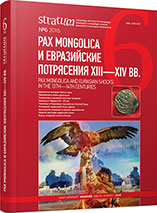Политические наследники Улуса Джучи в свете выезда татарской элиты в Москву (конец XV — первая треть XVI вв.)
Political Heirs of Jochi’s Ulus in the Context of Tatar Elite Departures to Muscovy (the End of the Fifteenth — First Third of the Sixteenth Centuries)
Author(s): Bulat Raimovich RakhimzyanovSubject(s): History, Diplomatic history, Political history, Middle Ages, 6th to 12th Centuries
Published by: Издательский дом Stratum, Университет «Высшая антропологическая школа»
Keywords: Golden Horde; Great Horde; Crimean Khanate; Muscovy; Tatars; Genghisids;political history;
Summary/Abstract: The article analyzes the role of Muscovy in the Later Golden Horde political relations, namely in relations with the Great Horde and the Crimean Khanate from the end of the fifteenth through the first third of the sixteenth centuries. This aspect has been seen through the prism of Tatar elite departures, both real and potential, to Muscovy. The members of the Great Horde and, after its defeat, the Crimean Khanate were conducting relatively common political line in their relations with Muscovy. Muscovy had a similar attitude to these states. The author maintains that, underlying this attitude, was the Mongol Conquest of the North-Eastern Russian principalities during 1237—1241, and, as a result, inequality of the statuses of the two sides (the Russians and the Tatars).
Journal: Stratum plus. Археология и культурная антропология
- Issue Year: 2016
- Issue No: 6
- Page Range: 213-227
- Page Count: 15
- Language: Russian
- Content File-PDF

